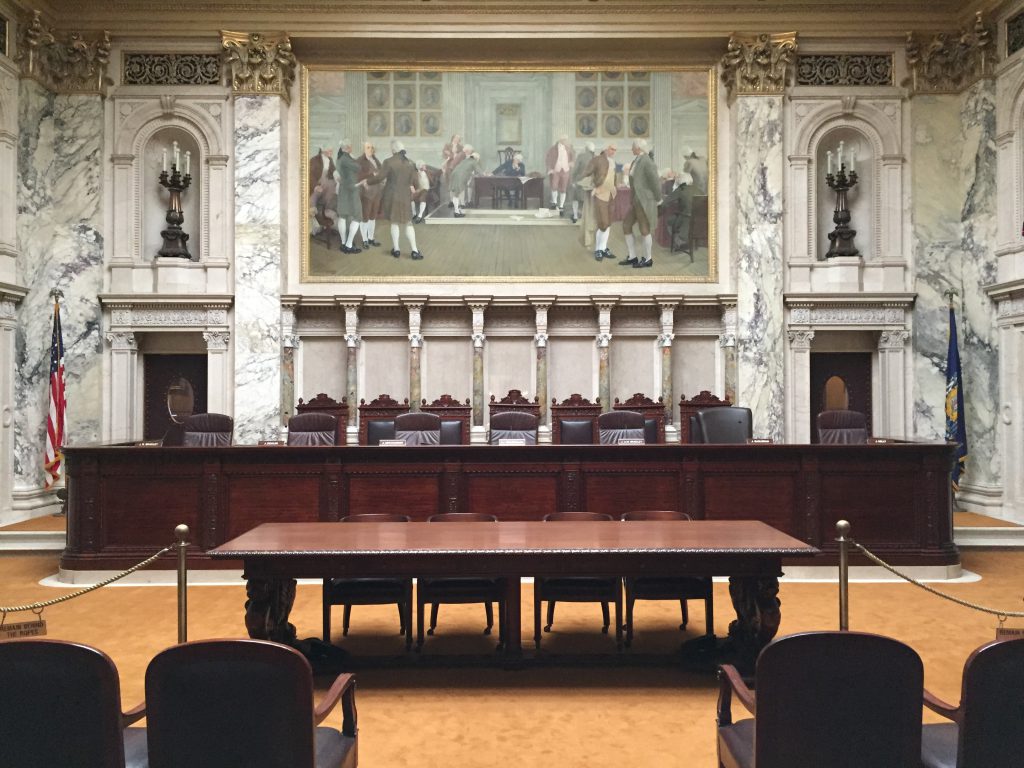State Faces Voter Suppression Effort
Not by the Legislature. Instead court cases seek new policies to restrict voting.
According to the Brennen Center’s state voting bills tracker, so far this year, 253 bills have been introduced in 43 states to restrict access to voting. Meanwhile, 704 bills would expand access to voting.
Somewhat surprisingly, Wisconsin is among the seven states on neither list. Perhaps Republicans recognize that any bill to restrict voting passed by the Legislature would be vetoed by the governor. And Democrats know that any bill to expand voting rights would never get out of a Legislature that is heavily gerrymandered to favor Republicans.
In the absence of legislative action in Wisconsin, advocates of voting restrictions have turned to the courts. In Jere Fabick v. Wisconsin Elections Commission, the Wisconsin Supreme Court is asked to rule against drop boxes, to ban the filling in of missing witness address information by election clerks, and to ban so-called “ballot harvesting,” the delivery of absentee ballots by someone other than the voter.
Jeré Fabick, the plaintiff in this case, has a long history of financial support for Republican candidates. A May 2020 article published by Urban Milwaukee listing the top 25 individual contributors to all partisan legislative and statewide races put him and his wife at 9th place with total contributions of $368,546 between January 1995 and December 2019.
In 2016, a big part of that money–$150,000—went to a SuperPAC called “Reform American Fund.” This fund raised over $7 million, all of which went to advertisements attacking Hillary Clinton and Russ Feingold. The biggest chunk of money for that group came from Diane Hendricks of ABC Supply, who made five contributions totaling nearly $5.6 million. The fund was managed by two Scott Walker aides.
Fabick owns Fabick CAT, the Caterpillar dealer for Wisconsin and parts of neighboring states. It appears that firm’s executives are also expected to share his enthusiasm for Republican Party. During the 2020 election cycle, seven branch managers made $500 contributions to Republican legislative candidates.
In addition to his political contributions, Fabick is well connected to the Republican infrastructure. He is listed as a “policy adviser” to the Heartland Institute, best known for its skepticism towards climate change, but born out of skepticism towards evidence linking tobacco smoking, secondhand smoke and lung cancer.
Jere Fabick v. Wisconsin Elections Commission is Fabick’s second recent case before the Wisconsin Supreme Court. In Jere Fabick v. Tony Evers he challenged the legality of the governor’s mask order. The Court held oral arguments on November 16, but has yet to issue a decision.
Matthew Fernholz, Fabick’s lawyer in both cases, is also very much part of the Wisconsin Republican eco-system, and serves as president of the local chapter of the Federalist Society.
How will the high court rule on Fabick’s case against the Election Commission? In some ways his argument parallels that made by Donald Trump’s lawyers in his challenge to the 2020 election results, Trump v. Biden. Trump argued that votes from Milwaukee and Dane counties should be thrown out because of four practices that Trump disagreed with.
Unfortunately, extrapolating Trump’s loss to Fabick’s challenge does not really work. In the Trump cases, the court majority did not rule based on its approval or disapproval of each of the challenged practices. Instead, the court ruled against Trump because he waited too long—in fact until after the votes were cast.
The spring election is currently underway, with absentee ballots already distributed, so it is extremely unlikely the court would apply its decision to this election. Instead, any decision would likely apply to next year’s spring election, and perhaps a scattering of special elections to fill vacancies. Thus, there is plenty of time before the next regular election and the issue of timeliness, sometimes called laches, is unlikely to apply. I found it strange, therefore, that three justices argued for consideration of Fabick v. WEC on an “expedited” basis.
The court is likely to decide each of the contested practices individually. As to drop boxes and witness address correction, Wisconsin law is silent: it neither endorses them nor does it specifically ban them. It would seem, therefore, that the court should uphold them. Part of the job of the election commission is to fill in the gaps in the law.
Wisconsin law does not address ballot collection, which Republicans have labeled “harvesting.” Thus, Fabick is asking the Court to create a new law, something that courts are not supposed to do. The only prominent example of fraudulent ballot collection occurred in North Carolina’s 9th Congressional District, where the Republican candidate hired an agent to help win the election. The agent distributed and picked up absentee ballots, apparently discarding those for the Democratic candidate. The resulting scandal led to indictments and a new election.
In any election there are likely to be a few people so committed to a candidate that they are willing to vote twice or create other acts of fraud. But research has shown this is rare. For the individual considering election fraud, the potential costs including jail time are likely to dwarf the benefits.
For someone trying to hold onto power, however, that cost-benefit ratio may flip. In the months leading up to the presidential election, and the weeks following it, Trump repeatedly warned about fraud. Ironically the major fraudster was him.
Data Wonk
-
Life Expectancy in Wisconsin vs. Other States
 Dec 10th, 2025 by Bruce Thompson
Dec 10th, 2025 by Bruce Thompson
-
How Republicans Opened the Door To Redistricting
 Nov 26th, 2025 by Bruce Thompson
Nov 26th, 2025 by Bruce Thompson
-
The Connection Between Life Expectancy, Poverty and Partisanship
 Nov 21st, 2025 by Bruce Thompson
Nov 21st, 2025 by Bruce Thompson




















